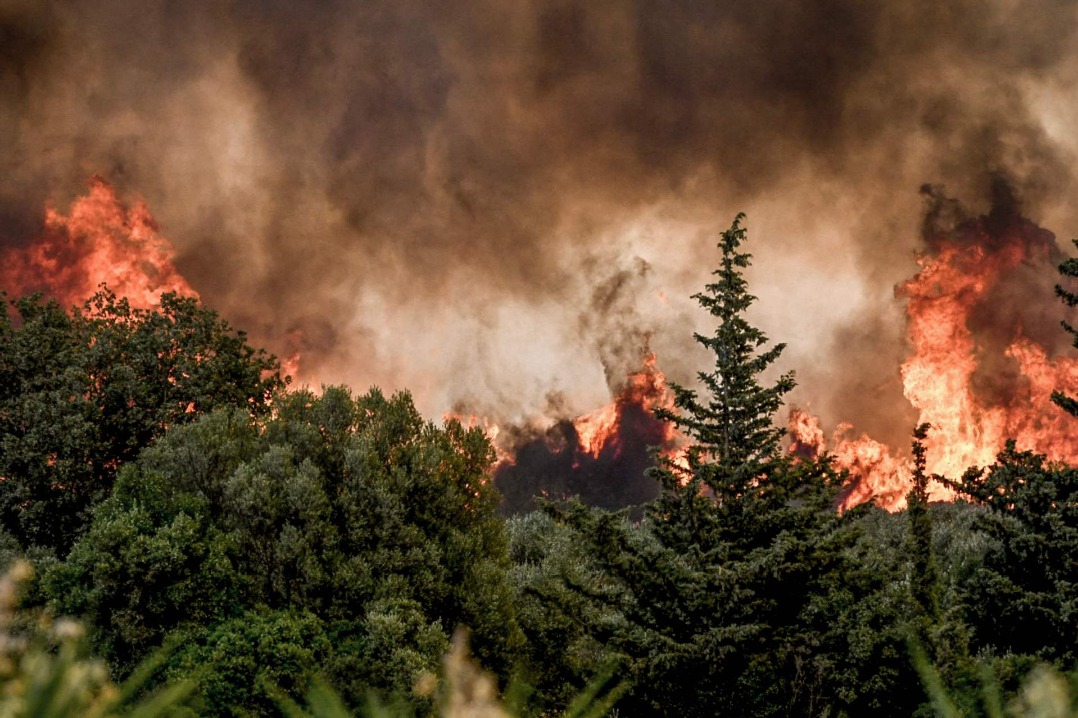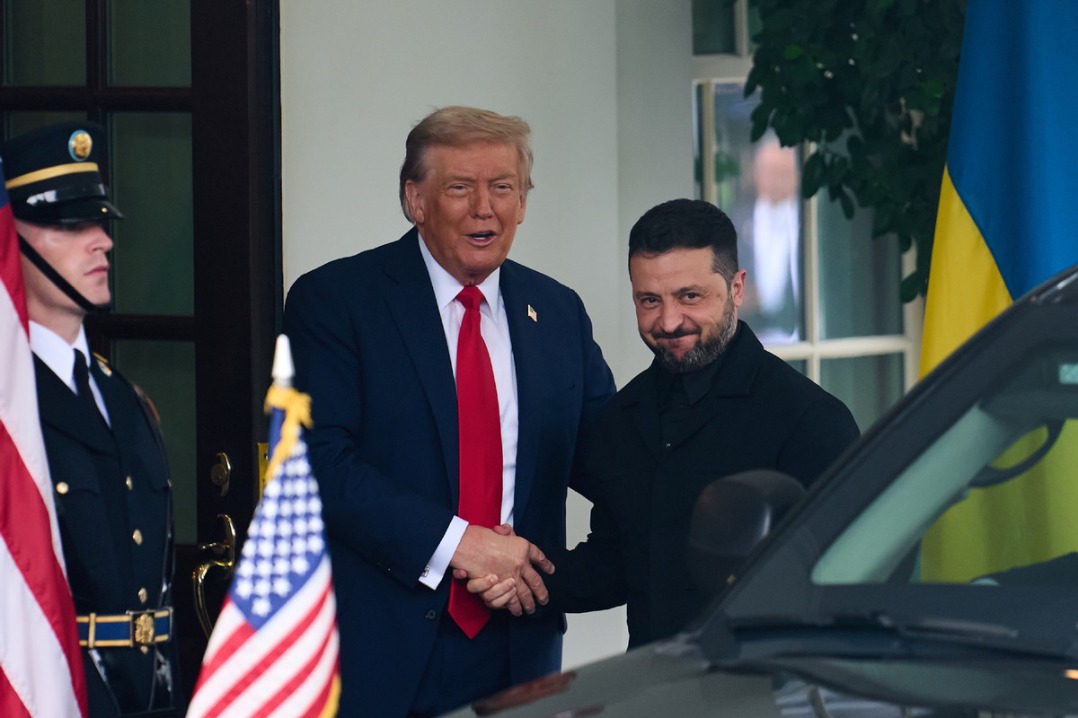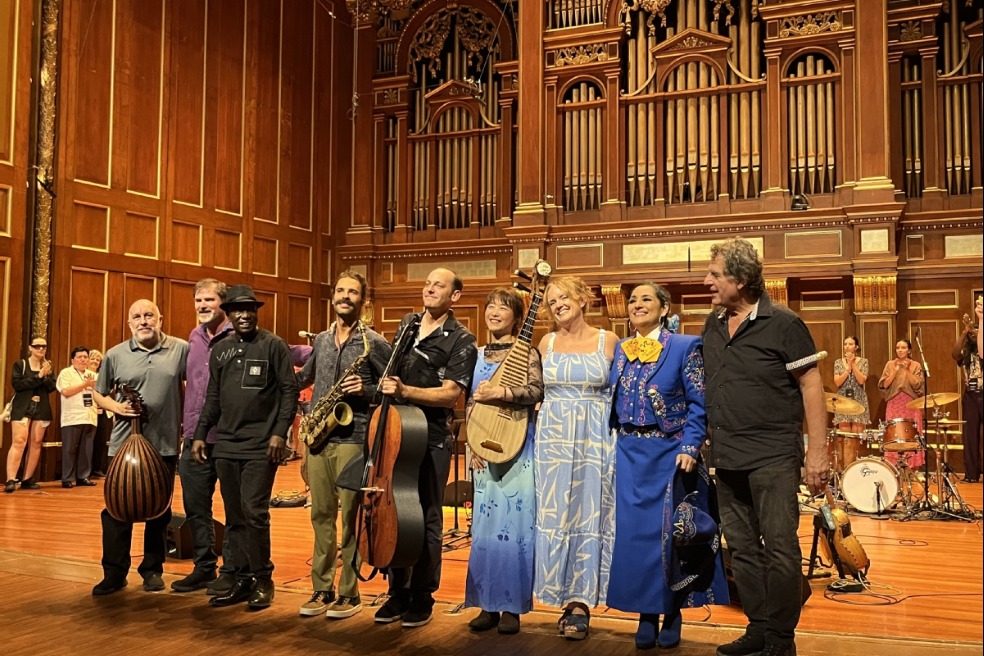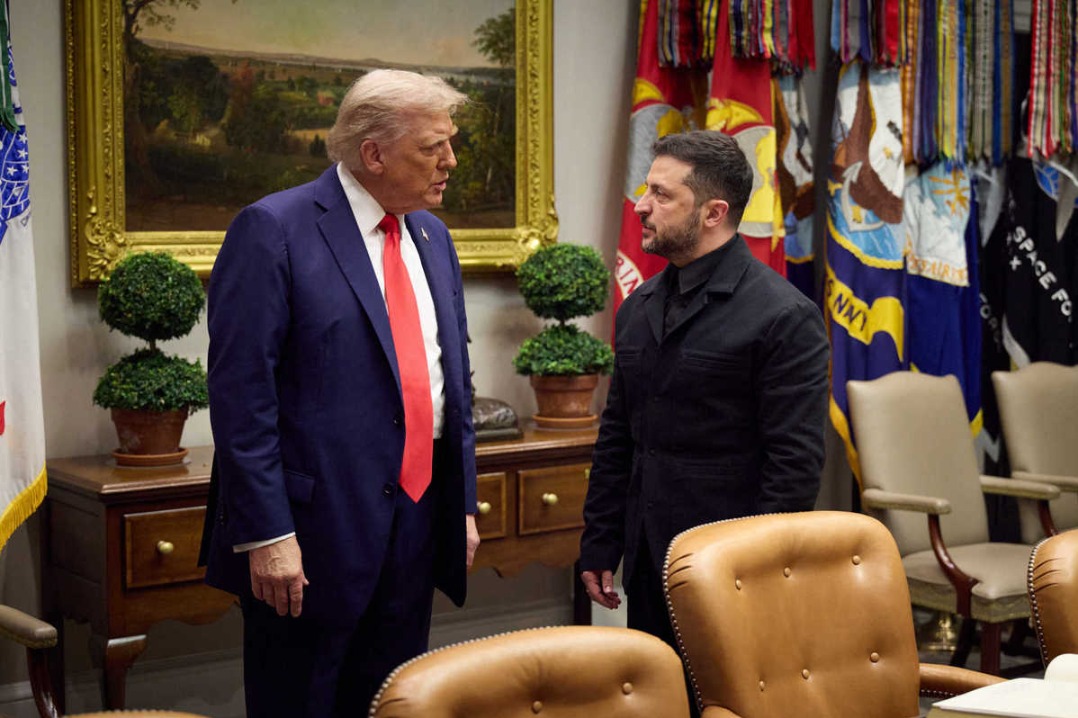Likelihood increases of Russia-Ukraine meeting






High-stakes diplomatic efforts at the White House on Monday have so far yielded a signal that the leaders of Russia and Ukraine may soon meet face-to-face in an attempt to solve their differences.
Experts noted that the potential Ukraine-Russia meeting, which could also become a US-Russia-Ukraine trilateral meeting, indicates some progress in narrowing differences between the concerned parties. However, they cautioned that territorial disputes would remain the key sticking point, and the outcome of such discussions remains uncertain.
US President Donald Trump hosted Ukrainian President Volodymyr Zelensky and seven European leaders at the White House on Monday, with a focus on resolving the Ukrainian crisis.
Russian President Vladimir Putin was not at the White House, but Trump called him during a break in the day's meeting, discussing arrangements for a possible Putin-Zelensky summit "at a location to be determined".
"After that meeting takes place, we will have a Trilat, which would be the two Presidents, plus myself," Trump stated on Truth Social. "Again, this was a very good, early step for a War that has been going on for almost four years."
Russian presidential aide Yuri Ushakov said on Tuesday that both Putin and Trump expressed support for continuing direct negotiations between Russian and Ukrainian delegations and discussed elevating the level of representatives participating in the talks.
German Chancellor Friedrich Merz told reporters the US and Russian presidents agreed in the calls that the meeting would be held "within the next two weeks".
European leaders seemed to be pressing their case for a central role.
"I would like to see a ceasefire from the next meeting, which should be a trilateral meeting," said Merz.
French President Emmanuel Macron went further, floating a quadrilateral format, with the European side joining in: "When we speak about security guarantees, we speak about the whole security of the European continent."
However, while leaders coalesced around the principle of talks, divisions surfaced on the path leading there. Trump suggested peace negotiations could proceed without a ceasefire, saying: "I wish they could stop, I'd like them to stop. But strategically that could be a disadvantage for one side or the other."
He argued that he has solved many conflicts without first reaching a ceasefire.
However, European leaders voiced disagreement while Zelensky himself struck a delicate balance. He signaled openness to a trilateral meeting with Trump and Putin, acknowledging that "sensitive things, territory, etc" would be discussed at the leaders' level at a trilateral meeting.
Sun Chenghao, head of the US-EU program at Tsinghua University's Center for International Security and Strategy, noted that the prospect of leader-level talks reflects "some progress" made in resolving the conflict but warned of "practical constraints".
"There is still fierce fighting on the battlefield. In addition, the 'ceasefire first' position of many European leaders conflicts with Trump's idea of 'negotiations without a ceasefire', which weakens the feasibility of a 'quick breakthrough'," Sun said.
A security guarantee for Ukraine was another central theme of Monday's discussions. Washington's guarantee remains deliberately vague. On Truth Social, Trump endorsed a "NATO-like" arrangement, whereby European countries would provide guarantees with US coordination. "They are a first line of defense because they're there, but we'll help them out," he said.
Zhang Hong, a researcher at the Chinese Academy of Social Sciences' Institute of Russian, Eastern European and Central Asian Studies, said, "The US statement on the security guarantee for Ukraine is a significant shift, promising to provide Ukraine with substantial security confidence."
US media reported that during the US-Russia summit on Friday, Putin for the first time agreed that the US and its European allies could offer Ukraine a security guarantee resembling NATO's collective defense mandate as part of an eventual deal to end the Ukraine conflict. If the report is true, it suggests a potential consensus on this matter among the US, Russia and Ukraine, Zhang said.
"The difference between the US and Europe lies in the fact that the US prioritizes a swift end to the Russia-Ukraine conflict, allowing a strategic pivotal shift to Asia. Their difference, however, is minor and indecisive," Zhang said.
"When the conflict ends hinges on whether Russia and Ukraine are going to make significant adjustments to their stances," he added. "So far, territorial disputes remain the biggest sticking point."
During a regular news briefing on Tuesday, Foreign Ministry spokeswoman Mao Ning said that China believes that dialogue and negotiation provide the only viable way out of the Ukraine crisis. China supports all efforts conducive to peace, she added.
Agencies contributed to this story.
Contact the writers at huanxinzhao@chinadailyusa.com





























